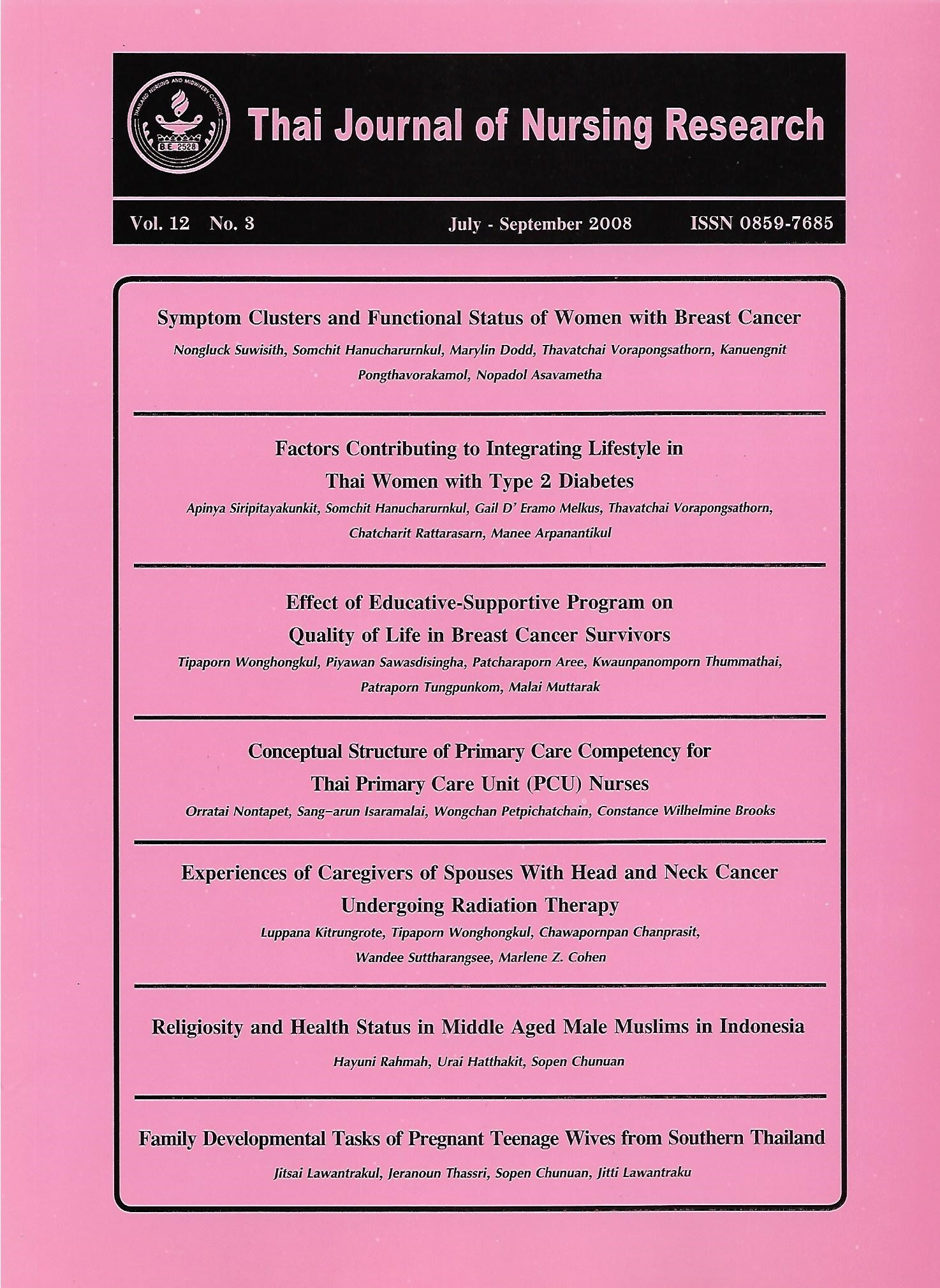Religiosity and Health Status in Middle Aged Male Muslims in Indonesia
Keywords:
ภาวะสุขภาพ, อินโดนีเซีย, ชายวัยกลางคนอิสลาม, การนับถือศาสนาAbstract
บทคัดย่อ
การศึกษาเชิงบรรยายครั้งนี้มีวัตถุประสงค์เพื่อศึกษาระดับการนับถือศาสนา (ทัศนคติและ แรงจูงใจภายในต่อศาสนาและการปฎิบัติศาสนกิจ) ภาวะสุขภาพ และศึกษาความสัมพันธ์ระหว่างองค์ประกอบของการนับถือศาสนากับภาวะสุขภาพ กลุ่มตัวอย่างเป็นชายวัยกลางคนจำนวน 126 ราย จากมัสยิดจำนวน 9 แห่งในกรุงจาการ์ตา เก็บรวมรวบข้อมูลโดยสุ่มกลุ่มตัวอย่างตามความสะดวกโดยให้กลุ่มตัวอย่างตอบแบบสอบถามด้วยตนเอง เครื่องมือวิจัยประกอบด้วย 3 ส่วน คือข้อมูลทั่วไปของกลุ่มตัวอย่าง แบบสอบถามเกี่ยวกับทัศนคติและแรงจูงใจภายในต่อศาสนาและการปฎิบัติศาสนกิจ และ แบบสอบถามภาวะสุขภาพ
ผลการศึกษาพบว่ากลุ่มตัวอย่างส่วนใหญ่มีทัศนคติและแรงจูงใจภายในต่อศาสนาในระดับต่ำ (ร้อยละ 57.9) และมีพฤติกรรมในการปฏิบัติศาสนกิจในระดับต่ำ (ร้อยละ 55.6) เมื่อพิจารณาถึงระดับการนับถือศาสนาโดยรวม พบว่าประมาณร้อยละ 27 ของกลุ่มตัวอย่างมีการนับถือศาสนาระดับสูง ในขณะที่ร้อยละ 40 มีการนับถือศาสนาโดยรวมในระดับต่ำ กลุ่มตัวอย่างที่มีพฤติกรรมในการปฏิบัติศาสนกิจสูงเพียงอย่างเดียวประมาณร้อยละ 15 และมีทัศนคติและแรงจูงใจภายในต่อศาสนาสูงเพียงอย่างเดียวร้อยละ 17.5 กลุ่มตัวอย่างส่วนใหญ่มีภาวะสุขภาพในระดับดีร้อยละ 69.1 และเมื่อพิจารณาภาวะสุขภาพเป็นรายด้าน พบว่ากลุ่มตัวอย่างส่วนใหญ่มีสุขภาพระดับปานกลางในทุกด้าน ผลการศึกษาความสัมพันธ์ระหว่างการนับถือศาสนาและภาวะสุขภาพ พบว่าทัศนคติและแรงจูงใจภายในต่อศาสนามีความสัมพันธ์ในระดับต่ำกับภาวะสุขภาพด้านจิตวิญญาณ (r = .26, p < .01) และพฤติกรรมในการปฏิบัติศาสนกิจมีความสัมพันธ์ในระดับต่ำกับการรับรู้ภาวะสุขภาพโดยทั่วไป (r = .24, p < .01) และภาวะสุขภาพด้านจิตวิญญาณ (r = .37, p < .01) ความสัมพันธ์ระหว่างองค์ประกอบต่าง ๆ ของการนับถือศาสนา และภาวะสุขภาพได้มีการอภิปราย พร้อมทั้งให้ข้อเสนอแนะในการศึกษาวิจัยต่อไป
คำสำคัญ: ภาวะสุขภาพ อินโดนีเซีย ชายวัยกลางคนอิสลาม การนับถือศาสนา
Abstract
The aims of this descriptive study were to describe the levels of religiosity and health status, and examine relationships among components of religiosity and health status. Using non-probability convenience sampling, 126 middle-aged, Indonesian, Muslim men were recruited through nine mosques in Jakarta. Data were collected via a self-report questionnaire consisting of three parts: the Demographic and Health Information Questionnaire, the Islamic Involvement Questionnaire (measuring religiosity) and the Health Status Questionnaire.
Findings revealed the majority of subjects had both low religious intrinsic orientation (57.9%) and religious behavior (55.6%). Approximately 27% ranked themselves as “high” in overall religiosity, while 40.5 % ranked themselves as “low.” Those who ranked themselves as “high” in religious behavior only accounted for 15% while those who ranked “high” in religious intrinsic orientation only was 17.5%. The majority (69.1%) indicated their level of health status was “good.” However, within the six specific components of health status, the majority ranked themselves at a “moderate” level. Positive correlations were found between religious intrinsic motive and spiritual health (r = .26, p < .01), and religious behavior and general health perception (r = .24, p < .01) and spiritual health (r = .37, p < .01). The relationships among various components of religiosity and health were discussed, and recommendations for further studies were also provided.
Keywords: health status, Indonesia, middle-aged Muslim men, religiosity
Downloads
How to Cite
Issue
Section
License
Copyright: The Pacific Rim International Journal of Nursing Research, Thailand Nursing & Midwifery Council has exclusive rights to publish, reproduce and distribute the manuscript and all contents therein.








.png)



